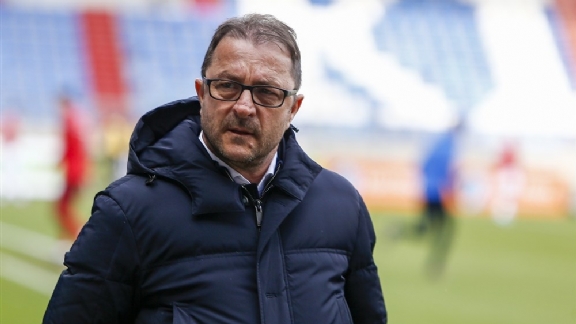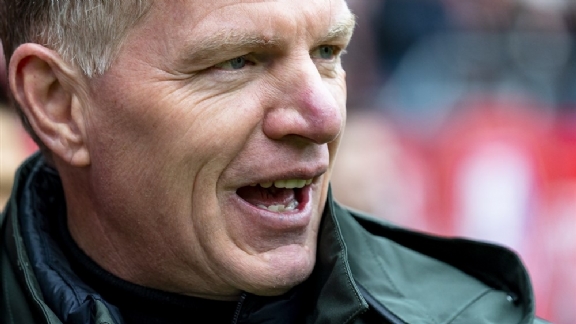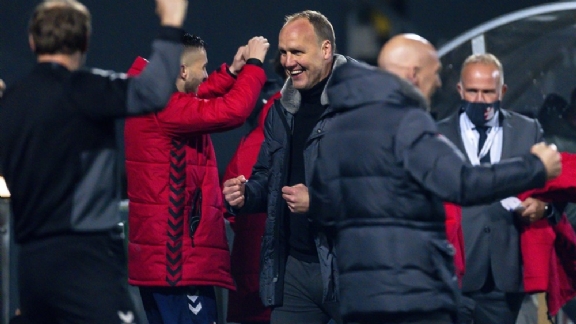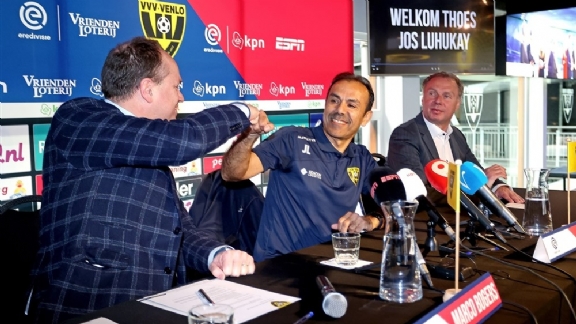![]()

It is a well-known phenomenon in football. Clubs in need of relegation that hope to create a shock effect with the end of the competition approaching and put a new trainer in front of the group. Fritz Korbach was known for bringing about a change in the seventies, eighties and nineties in a relatively short period of time in clubs in need of relegation and was thus able to call himself the founder of the Korbach effect. Willem II’s change of trainer seems to be going well this season, while Hans de Koning’s resignation at VVV-Venlo is still not very successful. Football zone investigated to what extent a change of trainer actually leads to the desired result at clubs in the lower regions of the Eredivisie. “There is a shock effect,” assures experience expert Fons Groenendijk.
By Mart Oude Nijeweeme
It may go a bit far to mention Groenendijk in the same breath as Korbach, but Groenendijk, who was born and raised in Leiden, can rightly say that he knows the ropes. Twice he took over from a colleague in the Eredivisie, once he got his congé and once Groenendijk threw in the towel himself. After he was put on the street at Willem II in 2010 by then technical director Henry van der Vegt, he decided in 2019 to choose eggs for his money at ADO Den Haag. “I had made certain agreements with the club. That was not about money, but about the sporty part. Those agreements could not be completed. Then with Sheraldo Becker, Nasser El Khayati and Wilfried Kanon also left my best players. The group of players was squeezed like a lemon. As a club you have to anticipate that, but that was not possible at ADO. It took months before a new director was announced. ”
And that while it still started so well for Groenendijk. In February 2017, he was the successor to Zeljko Petrovic, who was fired at the time. Groenendijk immediately went down on his baptism of fire as trainer of ADO to visit Go Ahead Eagles (3-1) and thus took over the last place from the team from Deventer, but then managed to bring about an unprecedented turnaround with six victories out of thirteen games. ADO finished the season in eleventh place and Groenendijk scored an average of 1.62 points per game, compared to 0.81 for Petrovic. A big difference. “I immediately said to the group in the locker room, ‘Guys, I’ve already booked my vacation and don’t plan to cancel it. Then you probably know that ‘. As a trainer you hope to strike a chord with that. I also firmly believe that a shock effect exists. ”

Fons Groenendijk took over from Zeljko Petrovic at ADO Den Haag in 2017 and then managed to crawl out of the lower echelons.
Jan van Ours and Martin van Tuijl share that opinion. The economists at Tilburg University compared from 2000 to 2014 situations in which a trainer was fired with comparable situations in which a trainer was not fired and came to the conclusion that poor results say nothing about the quality of a trainer. The pair conducted extensive research into the effect of coach changes in professional football. “There is often a short-term recovery that can be attributed, among other things, to psychological factors. Players can or must prove themselves again and there is a realization throughout the club that something must be done ”, Van Ours concluded at the time. “The board is speaking up, the press is getting involved and a new kind of force is taking over the team. But it is really not justified to completely rely on replacing the trainer in advance. Often enough, the new man fares worse than his predecessor. ”
Afke van de Wouw does not dare to use the word shock effect. In the past, the sports psychologist worked at VVV-Venlo, Vitesse, FC Twente and FC Utrecht and had many conversations with coaches and players. About dealing with pressure and the interaction between players and the technical staff. She wrote the book ‘Learning to perform’ about it and still works closely with the KNVB, where she is located with her company Wouw Performance Coaching. “I have experienced situations in which the contact between the trainer and the group of players had completely disappeared, while the trainer did not notice it. Is it then a shock effect? ”Van de Wouw wonders aloud. “If players no longer accept anything from a trainer, it becomes a difficult story. I can very well imagine that clubs decide to change tack if there is no connection anymore, nothing is accepted and a trainer is not open to change. ”
If there is a trainer for the group who is clearly there, who has contact with the players’ group and involves the players in the decision-making, this can certainly lead to a turnaround, says Van de Wouw. “Clubs don’t go to training camp for nothing. That provides variety. A different environment, different facilities and different opponents. That also applies to a trainer. Autonomy, bonding and competence are the three factors that underlie motivation. With autonomy you let the players think along in the process, with competence the trainer gives the player the confidence that he is developing and getting better and bonding ensures a good relationship. Ruud van Nistelrooy once said: ‘No performance without a relationship’. The generation that is arriving now clearly needs contact. Talk to them, stay in touch and manage the collaboration. That also includes difficult conversations. Timing is also very important. Do not conduct deep analyzes immediately after the game, but come back to this in a team discussion. It is important that a trainer knows himself well. “

Fons Groenendijk knows the ropes as a trainer of a club in relegation distress. Twice he took over from a colleague in the Eredivisie, once he got his congé and once Groenendijk threw in the towel himself.
Van Ours’ statements are contradicted by the current figures. Statistics of Opta show that a change of guard in recent years has indeed led to considerably better performances. Only in two cases did a successor fail to do better than its predecessor. In the 2016/17 season, Robert Maaskant achieved a points average of 0.43 against 0.74 from his predecessor Hans de Koning at the relegated Go Ahead Eagles, while a season later Gertjan Verbeek was unable to break the negative spiral at FC Twente. Verbeek came in eighteen games with the Enschede relegant to an average of 0.56 points per game, as his predecessor René Hake did a lot better with 0.75 points per game. Since the turn of the century, there has been a change of the guard 46 times in the lower regions of the Eredivisie. In half of the cases, a trainer eventually managed to secure body preservation.
Must say that the fate of some clubs was already sealed at the time of boarding. For example, Dick Advocaat relegated in the 2017/18 season with Sparta Rotterdam and Ruud Brood was unable to save the unsuccessful season of NAC Breda a year later. In that respect, Groenendijk provides excellent figures. The now unemployed coach stepped in twice and twice he managed to save the club from relegation. In 2009 at Willem II, in 2017 at ADO. “I know what it takes to pull a team out of the doldrums,” said Groenendijk. “As an interim trainer you always enter a team where things are not running at that moment. Both the group and the club are in a deep pit. It’s important to make everyone feel the same way and involve players in the things you do. But staff also need trust. Let them lead exercises. Give people confidence and come in with the conviction and the belief that you will turn it around. ”
In this way, Groenendijk also addressed the selection of ADO in 2017. “You have to change things. If you continue in the same way, it will not work, “Groenendijk believes.” And create clarity. Opt for one way of playing. There is no time to sharpen multiple ways of playing in a team. Don’t make it too difficult. Provide defensive security and make the locker room a safe place. That must be the place where everything can be said. Everyone has a role, everyone is important. If players cannot do that, you must also dare to ask them to leave. I have done that several times in the past. Everyone has to give something extra. Also the people around it. Office workers, technical staff, supporters. It’s not just about those ninety minutes on the field. ”

Such a Houdini act as that of Groenendijk at ADO in 2017 seems to be occurring at FC Emmen this season. A situation that is reserved for few clubs and trainers. The man who guided Emmen to the Eredivisie for the first time in club history in 2018 can also count on the support of the club management in difficult times. The story of Dick Lukkien and his team begins to take on fairytale forms. The team appeared dead and buried, only won its first victory of the season on February 20 of this year, but has since been on the upward trend. “Emmen will certainly make it,” says Groenendijk firmly. “They are in a similar flow as we were in 2017. The club has always continued to see perspective and has just let the trainer sit. One policy is not the other. I have seen players at Emmen who performed less than last year, but they have always kept the peace there and they are rewarded for that. ”
Arno Vermeulen gave the credits last week in Studio Voetbal mainly to the supporters of the Drenthe formation. “Normally they are in your garden early in the morning to scare you away when you are at the bottom. But you cannot always pass up a trainer. As a club you often know damn well whether it is still there with a trainer. Whether he behaves normally, whether there is still a healthy relationship with the players. Those are important things. And you have to be patient. You shouldn’t panic with every setback. There may really be a moment when you think: it really cannot go on like this. I doubted that with Adrie Koster. That went the other way so quickly. There is no Law of Medes and Persians that you should always leave a trainer. Sometimes trainers themselves are completely confused and they don’t know anymore. “

In Venlo, all pressure rests on the shoulders of Jos Luhukay, who was appointed by the VVV club management as the successor to the dismissed Hans de Koning.
Groenendijk believes that policymakers should look at the big picture more often. To the culture of the club. “That happens far too little. Ultimately, it is the people who make the decisions. They say they are the club, but in the end they determine who will be in certain positions. It would be good if club culture was taken into account more often in the decision of a club. How is played, how does a club want to play and to what extent does that differ from each other. Only then are you implementing policy. But that hardly ever happens. With Willem II, I had absolutely no click with Van der Vegt. He didn’t know me, I didn’t know him. That can also be a reason to break up. You sense that when someone wants to do their own thing. ”
Nothing is as fleeting in life as the job security of a football coach, Groenendijk also knows. He absolutely does not want to characterize himself as a savior. “I have also been a trainer over the years. I trained at Ajax for five years. I’ve been an assistant, done the Under-19, the Under-17. ” Nevertheless, he knows all too well that a mark in football is quickly forgiven. “I have shown that I master the trick. If I succeed it will give a huge boost and it feels like a liberation, but I would also like to train a club in the middle bracket. A club that competes for European football. As a player I have always played in the subtop. That’s what you want as a trainer. But if it doesn’t come, you just have to deal with it. Maybe I should just say that I consider myself a full-fledged Premier League coach. Hereby.”